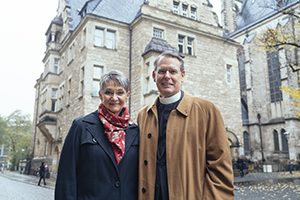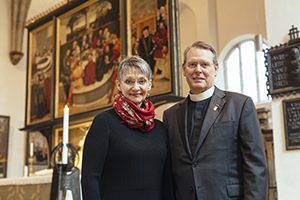In 2016, the ELCA and the city of Leipzig, Germany, agreed that Leipzig would host an ELCA member who would represent the ELCA and Leipzig during the 500th anniversary of the Reformation. The Rev. Dr. Robert Moore accepted the call after having served 23 years as pastor of Christ the King Lutheran in Houston. Along with his wife, Kathy, Moore has been working in both Leipzig and Wittenberg since July 2016 and will continue through June 2019.
The following is one of a two-part series Q&A that provides a brief glimpse into Robert’s and Kathy’s work and their experience to date. Next week part two will share Robert’s personal spiritual journey as part of this call.
ELCA500: How would you describe your daily interactions and work?
Robert Moore (RM): My daily work is quite varied, but most of the time is spent interacting with officials and other church representatives in both cities and beyond. We

Robert greeting the Pastors Emmanuel Jackson and Elizabeth Stein of Living Word Lutheran Church in Katy, Texas in the Castle Church of Wittenberg.
greet ELCA travel groups as we find out that they are coming to Wittenberg and/or Leipzig and I work with the well-known tour operators who are eager for their groups to be greeted. Kathy and I are also invited to functions, concerts, exhibit openings, conventions observances, congregational and ecumenical worship services.
As a rostered minister, I am officially a guest pastor at the historic St. Thomas Church Leipzig where Bach lived, worked, and is now buried. I also preach and preside in German at services on Friday, Saturdays and Sundays as needed. And, of course, you can imagine the considerable amount of correspondence primarily by email.
ELCA500: Since your arrival in Germany, what have you seen, witnessed and experienced as an American Lutheran in a largely non-Lutheran country that is the birthplace of the Reformation?
RM: The most significant observation is the degree to which the people of the former communist Germany are estranged from the church. That does not mean they are necessarily hostile, but there is much suspicion and little knowledge of church and the Christian tradition. It takes only a generation to bring a people to a state of unknowing. The observance of the Reformation and the focus on Martin Luther have not automatically won people over to reconsider the church and the faith, but there has been increasing interest throughout 2017.

Robert and Kathy at home on St. Thomas Square in Leipzig
ELCA500: How have Germans, as a whole, responded to the Reformation anniversary? And, to you as an American and Lutheran?
RM: Most Germans have been curious about my work as an ELCA representative during this Reformation anniversary period. They are pleased to know that Kathy and I are here.
The population of the former East Germany has become tremendously secularized and church membership is under 20 percent of the population. That does not mean that the church has lost its witness. On the contrary, the church plays a significant role. The opportunity lies in the effort to educate and memorialize the Reformation and for the people to learn anew who Martin Luther and Philipp Melanchthon were, both outside and inside of church.
Right now, the people are very aware of Luther’s anti-Semitic writings. In some cases, this unfortunate side of Luther is used to excuse the people from learning about his real accomplishments without ignoring his darker side.
ELCA500: What has happened thus far with the Reformation anniversary? Specifically, since the start of 2017?
RM: The anniversary year began with many functions such as concerts, worship services, seminars lectures, etc. Every city has had its own program while libraries have exhibitions and museums offer showings of major artifacts from the Reformation. Almost every town in Saxony, Saxony-Anhalt and Thuringia have something to do with Luther and his colleagues. These territories represent the area in which Luther could travel safely after Worms in 1521.
The first big event was the opening of the World Exhibition in Wittenberg on May 20. Throughout Wittenberg itself are exhibits from churches and institutions from around the world. These exhibits are open for the 95 days of the “Reformation Summer” ending on Sept. 10.
On May 25, the huge church gathering called the Protestant Kirchentag (church convention) began with over 100,000 persons participating in Berlin, Leipzig, Wittenberg,

Robert and Kathy in the City Church in front of the great Cranach Altar
Magdeburg, Eisleben/Mansfeld and Erfurt/Weimar. Protestants from all over the world came including our Presiding Bishop Elizabeth Eaton. Bishop Eaton presented a Bible study in Wittenberg and held a luncheon for all the local church leaders there. I was pleased to offer a Bible study in St. Thomas Church Leipzig and also a discussion with American and German colleagues in a tavern in another part of Leipzig. The ending of the four-day event was on the meadows of the Elbe River where 120,000 people gathered for worship opposite the distinguished cityscape of Wittenberg.
The Bach Festival in Leipzig, June 8-18 was set to the theme of “Reformation, Luther and Bach.” It was an outstanding festival with many guests from the U.S., especially from my former congregation, Christ the King Lutheran Church in Houston. Bach Society Houston sent their choir to sing in the context of the festival. The Bach Festival is one of the most significant Baroque music festivals in the world. Here one can hear the music of Bach in the same venues where his music was premiered. It is stirring to listen to the highpoint of the Lutheran musical tradition in this historic context.
ELCA500: What is on the horizon regarding the fall and October?
RM: We are looking forward to the next high point which is Reformation Day, Oct. 31, 2017. The ELCA will offer an early morning eucharist in the Castle Church with the Rev. Dr. Rafael Malpica-Padilla, executive director of ELCA Global Mission, preaching and me presiding. I will participate in the German service later that morning. Both services will be packed. Normally there would be two services. This year, however, will include a nationally televised service in the afternoon with Chancellor Angela Merkel and President Frank-Walter Steinmeier in attendance. The city will be filled with all kinds of activities and exhibitions.



